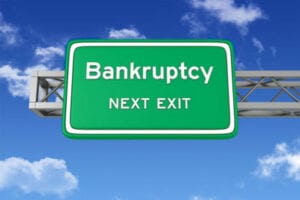Declaring bankruptcy is not a decision to take lightly. Some amount of debt can be a good thing for your credit profile.
But too much mounting debt can be tough to manage. Not only can it be challenging to make payments on time, but it can also be impossible to make them at all. And this can slow your debt-free goals.
Often, consumers resort to filing for bankruptcy to deal with their debt. But while this might be a temporary solution, it’s not without its drawbacks.
In the short term, declaring bankruptcy can cause your credit score to tank. Over the long term, bankruptcy will result in a black note on your credit report. This will make it impossible for you to apply for new credit, take out a loan, or even get a mortgage for years.
Before you take this route, consider an alternative to bankruptcy. There may be other options available to you that can help you with your debt.
Read on to find out about alternatives to declaring bankruptcy that can help bail you out of financial trouble.
Debt Consolidation Loan
If you have several different loan accounts, debt consolidation might help. You’ll be able to save money and manage your debt a lot easier. This is especially true if most of your debt accounts come with sky-high interest rates.
Debt consolidation loans involve taking out one large loan that you use to pay off all your other loans. If you’re having a tough time keeping up with your debt payments, a debt consolidation loan with your creditors might be a great option.
Combining all your debt into one payment with a consolidation loan at a low rate can help you pay down your debt faster. Rather than making several loan payments, you’d only be responsible for making one loan payment per month. Payments continue until the outstanding balance is repaid.
You can get debt consolidation loans through your bank or other financial institution. You can also get them from a debt relief company.
Debt Management Program (DMP)
If you don’t qualify for debt consolidation, then a debt management program may be the solution. It’s also referred to as a “debt repayment plan” or “debt management plan.” This program will provide you with a simpler payment plan for your debts. It can also help reduce the strain of interest costs.
Obtain debt management help from non-profit debt relief organizations. With this program, you will meet with a credit counsellor and go over your specific situation. Credit counsellors will help you come up with a workable budget. They will also advise you on how to better deal with your debt issues.
If your debt is far too deep for money management skills to help with, then you can come up with debt plans. In this case, the credit counsellor will work out a deal with your creditors. You’ll then be responsible for making regular monthly payments to the debt management agency.
These funds will then be distributed to your creditors. Your credit counsellor may be able to have your interest rates reduced significantly. This can further help you save money.
While this type of program can be helpful, there are some disadvantages to a debt management plan. For starters, there’s always a chance that your creditors might not agree to an alternative arrangement. They may still insist that you repay them the full amount owed along with the initial interest rate.
There are also fees that you will have to pay to your credit counselling agency. Further, your credit score will be affected for two years after program completion. Be sure to weigh the pros and cons of this program before you choose it.
If you do decide to go with a nonprofit debt management program firm, there are steps you should take to rebuild your credit. A great way to establish good credit is to take out a secured credit card. This requires a deposit upfront that serves as your credit limit. These cards are much easier to get approved for because they are secured by your cash deposit.
Once you have that card, be sure to make timely payments to help build good credit. Your payment history plays a key role in your credit score.
Unsure which option is the right one for you? Speak with a trained credit counsellor today
Debt Settlement
A debt settlement program works a little differently than combining all your debt into one payment. Debt settlement companies will negotiate with your creditors on your behalf. The goal is to reduce the amount that you owe them. If you are having trouble paying your debt bills in full, debt settlement negotiation might be a good option.
The amount that your debt settlement representative may be able to whittle down your debt will depend on many factors. Further, there is no guarantee that a settlement will be reached or how much of a settlement can be attained. If you come to an agreement, you will provide your creditors with one lump sum payment to ease your debts.
Weigh the debt settlement pros and cons before deciding if this is the route you want to take. The advantages are obvious: you can get away with paying a lot less than what you initially owed.
But there are some drawbacks as well. For instance, you will need to come up with a lump sum of money. If your current finances can’t support that payment, this might not be a viable option for you.
Further, you may negatively impact your credit score if the credit bureaus find out about your settlement. This note can stay there for as long as seven years from the date of your settlement.
Consumer Proposal
A consumer proposal may be your last resort before opting for bankruptcy. With a consumer proposal, you will work with a Licensed Insolvency Trustee (LIT), who will present a sound proposal to your creditors.
This proposal is an offer that you make to your creditors whereby you promise to pay them a percentage of how much you owe them. Or, you may ask for more time to pay off your outstanding balance. Your LIT will assess your financial situation and go over consumer proposal pros and cons with you. This will help you decide if this is the right option for you.
The consumer proposal process files your proposal with the Office of the Superintendent of Bankruptcy (OSB). Your creditors have 45 days to either accept or turn down your proposal.
If the OSB accepts your proposal, you’ll stop making direct payments to your creditors. You will then make all payments through your LIT who will then pay off all your creditors on your behalf.
The advantages of a consumer proposal include the chance to avoid bankruptcy if your creditors agree to your proposal. Also, wage garnishing and lawsuits cease.
As far as disadvantages of a consumer proposal are concerned, your credit score will take a hit. A consumer proposal will stay on your credit report for three years after you pay it off. From that point on, you’ll need to consider rebuilding credit after the consumer proposal. This will help you strengthen your financial position and be eligible for loan and credit products once again.
There Are Alternatives to Bankruptcy
Do you think you want to file for bankruptcy in Canada? Before you take that step, consider all your options. Remember, it’s a hefty legal process. Declaring bankruptcy may offer you relief from your mounting debt, but you may have other options.
Debt problems may be plaguing you, but there is help available. Reach out for help today and ask about our free credit counselling sessions.
You do have options for debt relief. For more information, call one of our trained credit counsellors at (844)-402-3073 or check out our onlin debt analysis.
Related to: Alternatives to Declaring Bankruptcy in Canada




